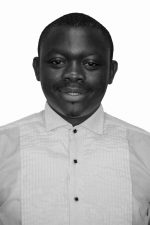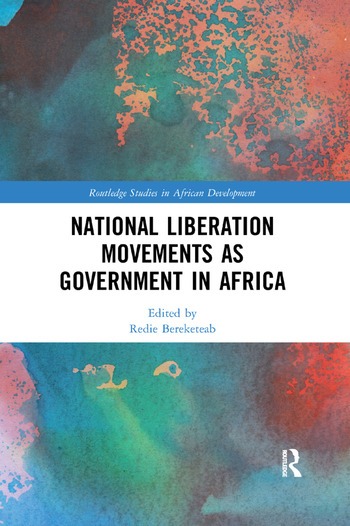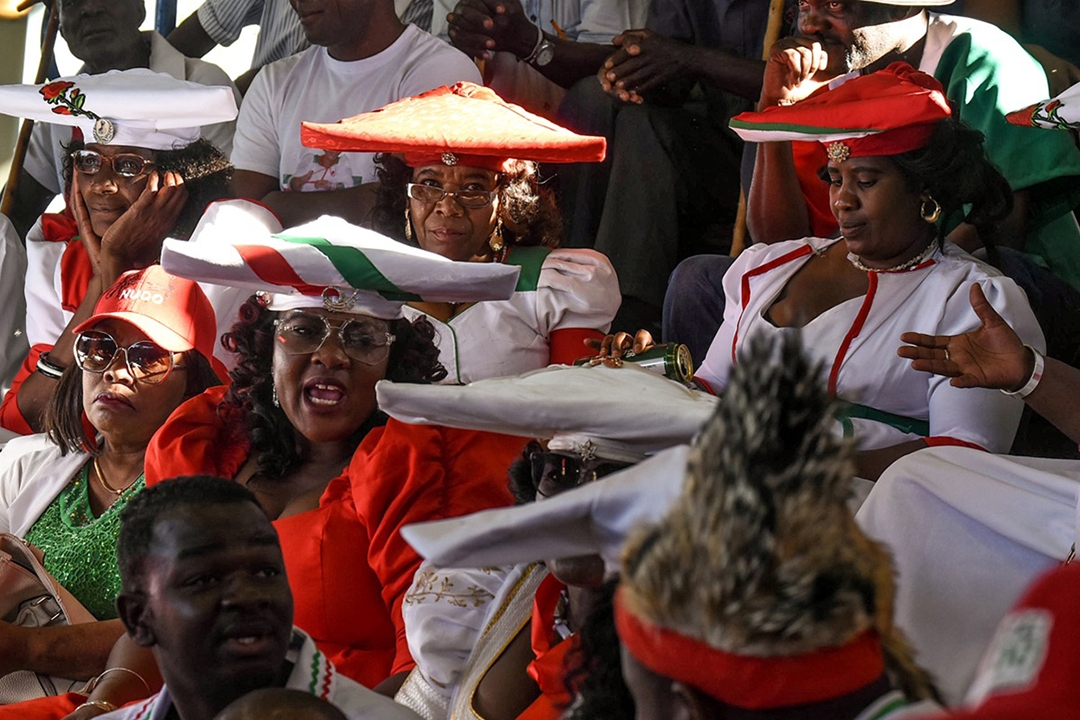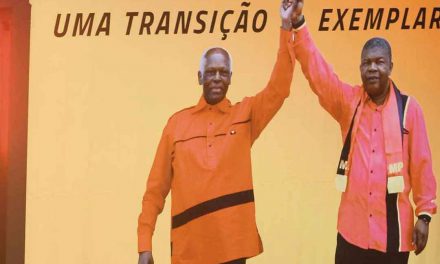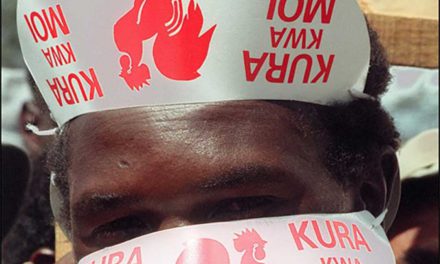Presidential silence over burning issues spawns new resistance groups
In June 2019, protests at a five-star luxury hotel in Switzerland marked a turning point in Cameroon’s President Paul Biya’s traditional long stays abroad. More than 250 protesters, clad in military-style garb and waving Cameroonian flags, staged demonstrations against the presence of their “absent” president.
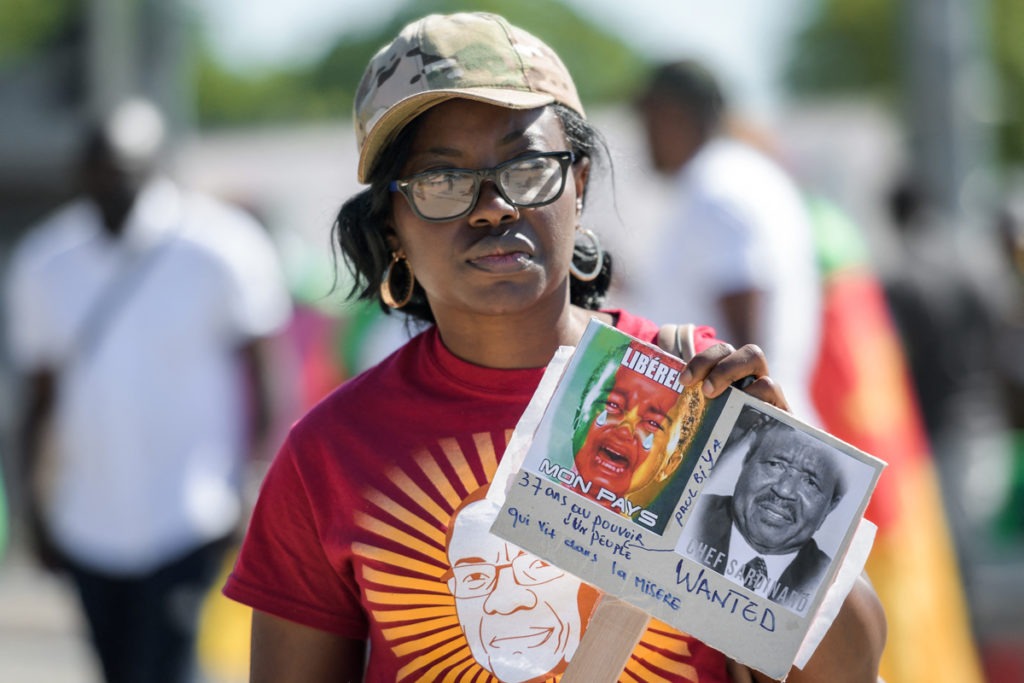
A woman holds a placard during a demonstration with other Cameroonian nationals living in different European countries against the presence of Cameroon President Paul Biya, in Geneva on 29 June, 2019. Photo: Fabrice Coffrini/AFP
Swiss riot police broke up the protests, but the message was clear. Biya cut short his “brief private stay” abroad and returned to Cameroon a few days later. Since then, he has not left the country on one of his usual private trips.
In 2018, an Organized Crime and Corruption Reporting Project (OCCRP) investigation disclosed that between 1982, when Biya, now 88, came to power, and 2017, he had spent no less than four-and-a-half years of his 35-year rule on private jaunts out of the country. These excluded official visits.
The cost of those trips has been estimated at $65 million, excluding food, drinks, shopping, entertainment and private jet rentals, amongst other expenses. But it is not only the use of taxpayer’s money to fund these trips that angers Cameroonians. Despite a promising start when he assumed power in 1982, Biya’s almost four decades in power have been characterised by poor governance, the repression of freedoms, lack of significant economic and political reforms, as well as the marginalisation of the Anglophone population, all of which have incentivised dissident groups.
While Obiang Nguema of Equatorial Guinea holds the gold medal as Africa’s longest-serving head of state, Biya has the silver medal, with no signs that he is ready to relinquish the trophy. Biya has ruled Cameroon since long before more than half of the country’s 25.6 million people were born. He is expected to complete his current mandate in 2025, when he will turn 92.
Biya’s hold on power is remarkable; in 2008, there were nationwide agitations when parliament revised the constitution – adopting a bill which eliminated the two-term presidential limit – to allow Biya to seek re-election. Since then, presidential elections in the country have been successively marked by voter apathy, gross irregularities and fraud, according to independent election monitoring bodies like Transparency International.
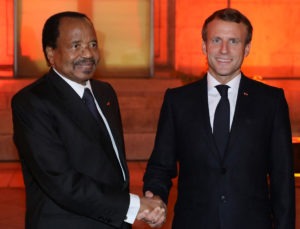
French President Emmanuel Macron poses with Cameroon’s President Paul Biya as they shake hands at the city hall in the French city of Lyon 9 October, 2019. Photo: Ludovic Marin/AFP
When Biya rose to power in 1982 he pegged his leadership on “rigour, moralisation and democratisation”. His promise of a democratic and economically vibrant country was lofty and gladly welcomed by a large majority. But more recent developments have eroded the gains made in his early presidency and Cameroon is now a textbook example of a fragile state, thanks to, among other things, centralised and personal leadership, widespread corruption and weak institutions, according to the International Crisis Group. The country is classified on the 2020 Fragile State Index as the 11th most fragile state out of 178 globally. The US-based democracy, political freedom and human rights advocacy body, Freedom House, has in the past five years rated Cameroon as “not free” where political rights and civil liberties are concerned.
A notable example is Biya’s handling of what has become widely known as the Anglophone crisis. As the International Crisis Group noted in a 2017 report, the crisis has its origins in the badly executed reunification of French and British occupied Cameroon at independence, “based on centralisation and assimilation, [which] has led the Anglophone minority to feel politically and economically marginalised, and their cultural differences are ignored.”
In 2016, low-level protests by English-speaking lawyers and teachers, seeking reforms of the legal system and other demands, erupted in the north-west and south-west regions of Cameroon. In a bid to suppress dissent, the president deployed the army, including the elite Rapid Intervention Battalion (BIR) that has specialist training in advanced torture techniques and a record of rights violation and extra-judicial killings.
The brutal crackdown radicalised many and pushed even those who were initially moderate to extreme positions. Anglophone dissidents became even more resolute on their opposition to marginalisation by the Francophone-dominated government. Since then, more than 30 pressure groups, liberation movements and militia have risen to push for the creation of a separate state they would call Ambazonia.
The conflict, which many analysts say could have been avoided, has caused untold economic damage for the entire nation as important revenue streams have been lost. Also, more than 5,000 civilians, soldiers and separatist fighters have been killed, while there have been mass displacements.
Dr Christopher Fomunyoh, senior associate for Africa and regional director for west and central Africa at the National Democratic Institute, considers the protracted separatist conflict as a “man-made crisis”. The Biya government’s failure to address the frustration of Anglophones and perceived institutional marginalisation has directly led the country to this critical point, he says.
Analysts also point to France’s immediate and continuous post-colonial influence on Cameroon’s leaders, which has been instrumental in setting the scene for current events in the country. Most of the actions or inactions of the Biya government have the backing of Paris.
According to Bamnjo Herman, a lecturer in the department of political science at the University of Bamenda, French colonialism never ended but took on a new, sophisticated form. Former French colonies, he says, including Cameroon, signed a secret colonial pact with France. “Among other issues [contained] in the pact is the fact that France has to train forces, and former colonies have to deposit their reserves in the French treasury – and for them to withdraw, they must give an explanation on how they intend to use the money.”
Meanwhile, in managing his country, Biya has adopted a strategy of “presidential silence”, preferring to stay mute over burning issues of national concern rather than publicly address them.
One recent example has been his management of the coronavirus pandemic. While other African presidents were at the forefront, reassuring their people and leading the response to Covid-19, Biya only managed to address the nation once, in late May 2020, after intense pressure from civil society and political parties. It is the same way Biya has remained indifferent to other key national issues, which are now almost splitting the country apart.
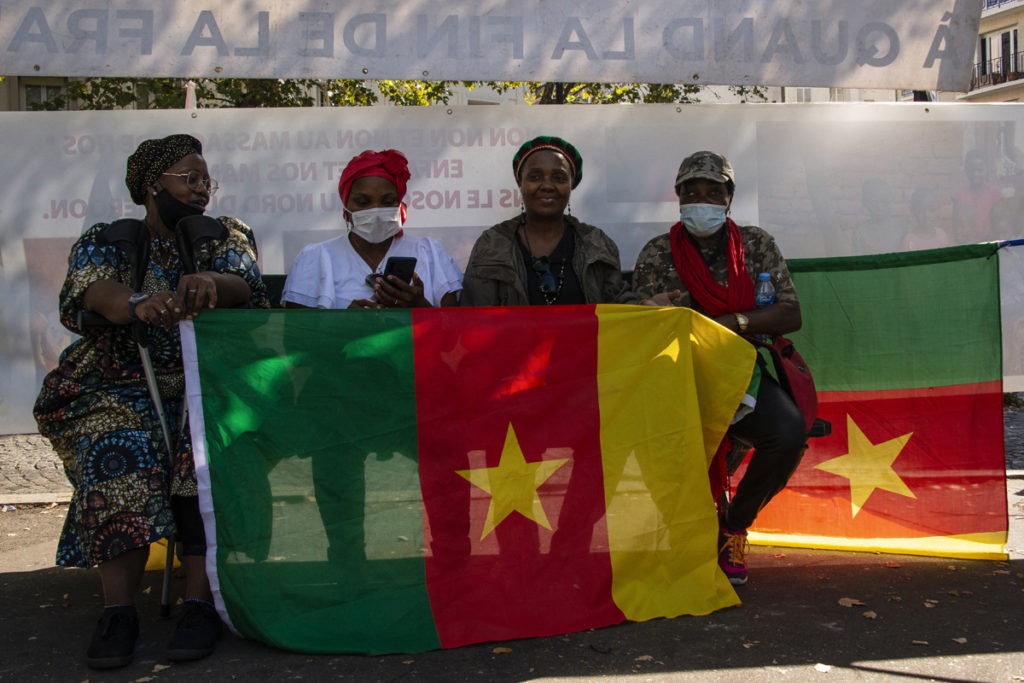
Cameroonian activists sit behind a national flag during a demonstration against the country’s president, Paul Biya, in Paris, 22 September, 2020. Demonstrators in front of Cameroon’s embassy in the city were pushed back by police after throwing projectiles. Photo: AFP
As people lose hope in the system, fresh dissent is brewing in various parts of the country such as the northern regions where the people are facing real and perceived economic deprivation, aggravated by the climate crisis. Recently, a pressure group, Mouvement 10 millions de Nordistes, was formed, bringing together people from the three northern regions. Though Guibai Gatama, the group’s flag bearer, has said the organisation is apolitical and aims to boost socio-economic development, the government outlawed it. Since then, the group has gone underground.
The volatile situation in the north also has its roots in Cameroon’s post-independence history. In November 1982, the country’s first head of state (from the north) resigned and handed over power to Biya who was his prime minister. The transition was smooth, but tensions later erupted, culminating in an attempted coup in April 1984 blamed on Ahidjo loyalists. The coup d’état was violently suppressed and northerners within the army and government were systematically punished. Since then, no process of reconciliation has been initiated, and the happenings of 1984 remain a source of bitterness for many from the north.
Amindeh Blaise Atabong is a Cameroonian freelance journalist. His interests include gender, human rights, climate change, environment, tech, conflict, peace-building and global development. In 2019, he was a finalist in the inaugural True Story Award, and also won a prestigious Kurt Schork Award in International Journalism. His works have been published by independent regional and international outlets, including Quartz, Mail & Guardian, Reuters, Jeune Afrique, Epoch Times, African Arguments and Equal Times.

